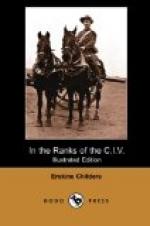July 4.—Wednesday.—Up at five after a bitterly cold night, but there was a long delay before starting. We are rear-guard to-day. Just before leaving an infantry man shot himself while cleaning his rifle. There was a little buzz and stir, and then all was quiet again. He was buried in half an hour.
A dull day’s marching. After about ten miles we halted to water horses and rest. While watering, the Boers sent over a futile shell from a big gun. On return we unhooked and grazed the horses. Things looked peaceful, and there was a warm sun, so I ventured to unstrap my kit-roll and spread my blankets out to dry. They were still wet from the rain of two nights ago. I had scarcely spread them out when “Hook in” was shouted, and back they had to go, half-folded, in a perilously loose bundle. (You can never count on five minutes, but it’s worth trying.) At about 4.30 we and the 38th Battery trotted ahead about a mile and a half, and began shelling a ridge; but I think it was soon abandoned, for shortly after we limbered up and camped with the rest of the brigade, which had followed us. I am “stableman” to-day for three days. On the march this involves drawing sacks of forage from the Quartermaster Sergeant in the early morning and late evening, and serving out the oats to the drivers of the sub-division. It is not so irksome a duty as in a standing camp, but has its trying moments; for instance, when drivers are busied with bed-making or cocoa-cooking in the evening, and are deaf to your shouts of “D drivers, roll up for your feeds!” a camp-cry which has not half the effect of “Roll up for your coffee!” or, more electrical still, “Roll up for your rum!”
July 5.—We were up at 4.30, but as usual had to stand by our horses for over an hour, freezing our feet in the frosty grass before starting. Harnessing up with numbed fingers in the dark was a trying job. My harness sheets were stiff as boards with frozen dew, and I had to stamp them into shape for packing. I had a warm night, though. My bed is made thus: I place the two saddles on end, at the right distance for the length of my body, and facing inwards, that is, with the seats outwards; I leave the horse-blankets strapped on underneath them, as there is not much time to re-fold and re-strap them in the morning, and my head (pillowed on two feed-bags filled overnight for the early morning feed) goes in the hollow of one saddle, between the folds of the blanket, and my feet in the hollow of the other. The rest of each set of harness is heaped behind each saddle, and when the harness-sheets are spread over each set there is enough for the ends to lap over and make a roof for the head, and also for the feet. Then I wrap myself in my two blankets, and if an oatsack is obtainable, first get my feet into that. My waterproof sheet serves as counterpane. It is not wanted as a mattress, as no dew falls till the morning, and the ground is dry at bed-time. After




